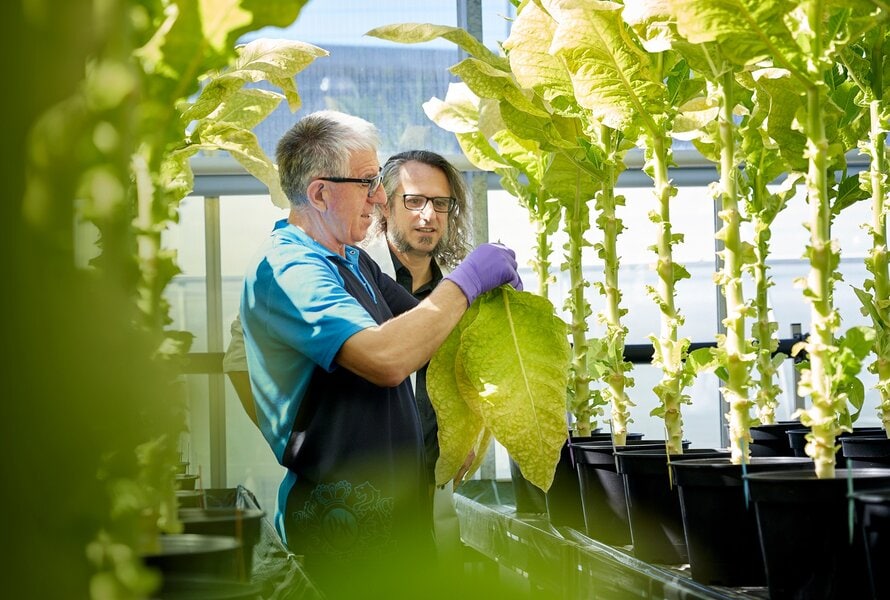PMI has published its Integrated Report 2019.
This year, we’ve evolved our traditional sustainability reporting into an integrated overview. In doing so, we’re providing a comprehensive outline of how PMI’s strategy, governance, and performance is delivering value over the short, medium, and long term.
Our Integrated Report 2019 offers a comprehensive review of PMI’s environmental, social, and governance (ESG) performance, while demonstrating the company’s meaningful progress toward delivering a smoke-free future. It’s our ambition to switch over 40 million adult smokers who would otherwise continue to smoke to smoke-free products by 2025, with at least half of that total to come from non-OECD countries.
Evolving from sustainability reporting to integrated reporting helps investors make the connection between our product-focused sustainability initiatives, which form the core of our ESG strategy, and our financial performance over time. The Integrated Report 2019 provides an in-depth look at how PMI is focused on developing, scientifically substantiating, and responsibly commercializing smoke-free products that are a better choice for adult smokers than continued smoking. The aim is to completely replace cigarettes as soon as possible. With the right regulatory encouragement and support from civil society, we believe cigarette sales can end within 10 to 15 years in many countries.
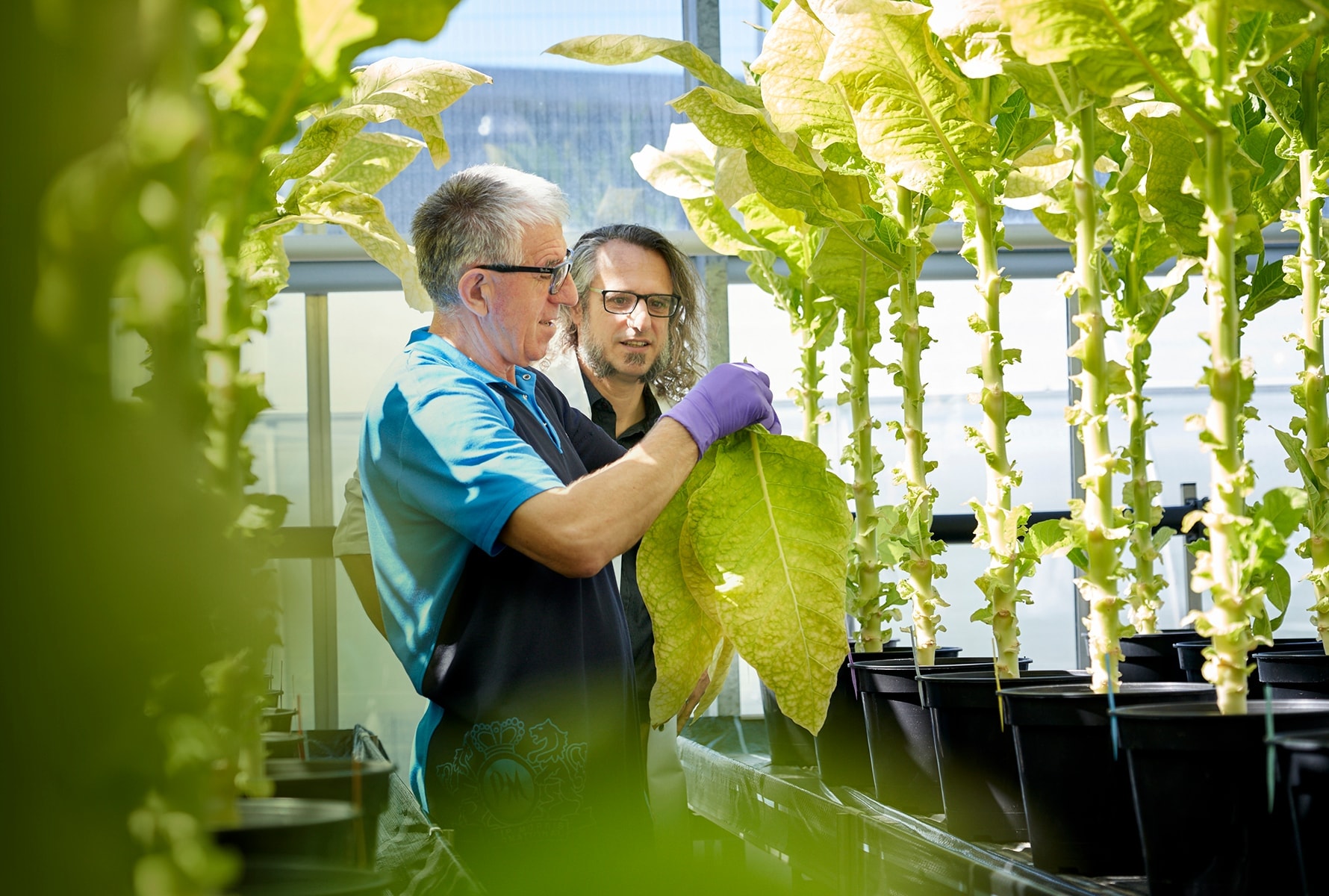
PMI’s Statement of Purpose, adopted by the company’s Board of Directors earlier this year and published in our 2020 proxy statement, is also available in the Integrated Report.
André Calantzopoulos, Chief Executive Officer of PMI, explained: “PMI’s Statement of Purpose reaffirms our commitment to deliver a smoke-free future for the benefit of people who would otherwise continue to smoke and, hence, to global public health. It is clear to all of us at PMI that the biggest positive impact our company can have on society is to replace cigarettes with less harmful alternatives for those adults who would otherwise continue to smoke; this is at the very core of our corporate strategy and sits atop our sustainability priorities.” *
The PMI strategy for a smoke-free future
In late 2019, we refreshed our sustainability materiality assessment, engaging with more than 800 internal and external stakeholders to identify and prioritize topics where we can have the greatest impact. This resulted in an updated focus on the company’s four strategic sustainability pillars:
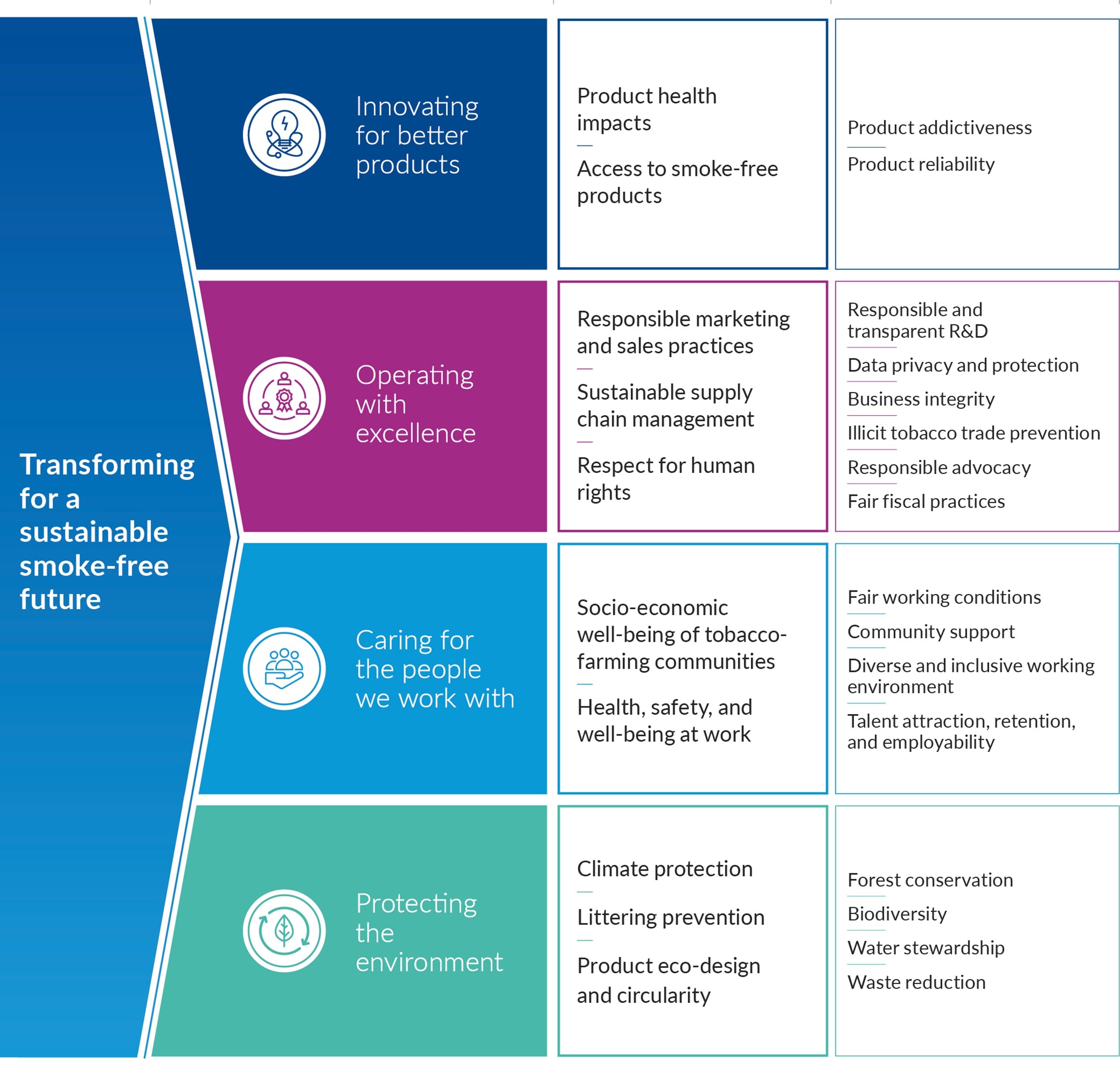
Our 2025 sustainability targets
During 2019, PMI also crafted a 2025 roadmap based on our sustainability materiality assessment and focusing on tier-1 topics. These are the areas in which we believe we can make the greatest difference.
Each priority topic falls under the responsibility of a member of PMI’s senior management team, and is assigned a target against which our progress will be measured and reported on annually. We plan to include a more comprehensive overview of this in next year’s report.
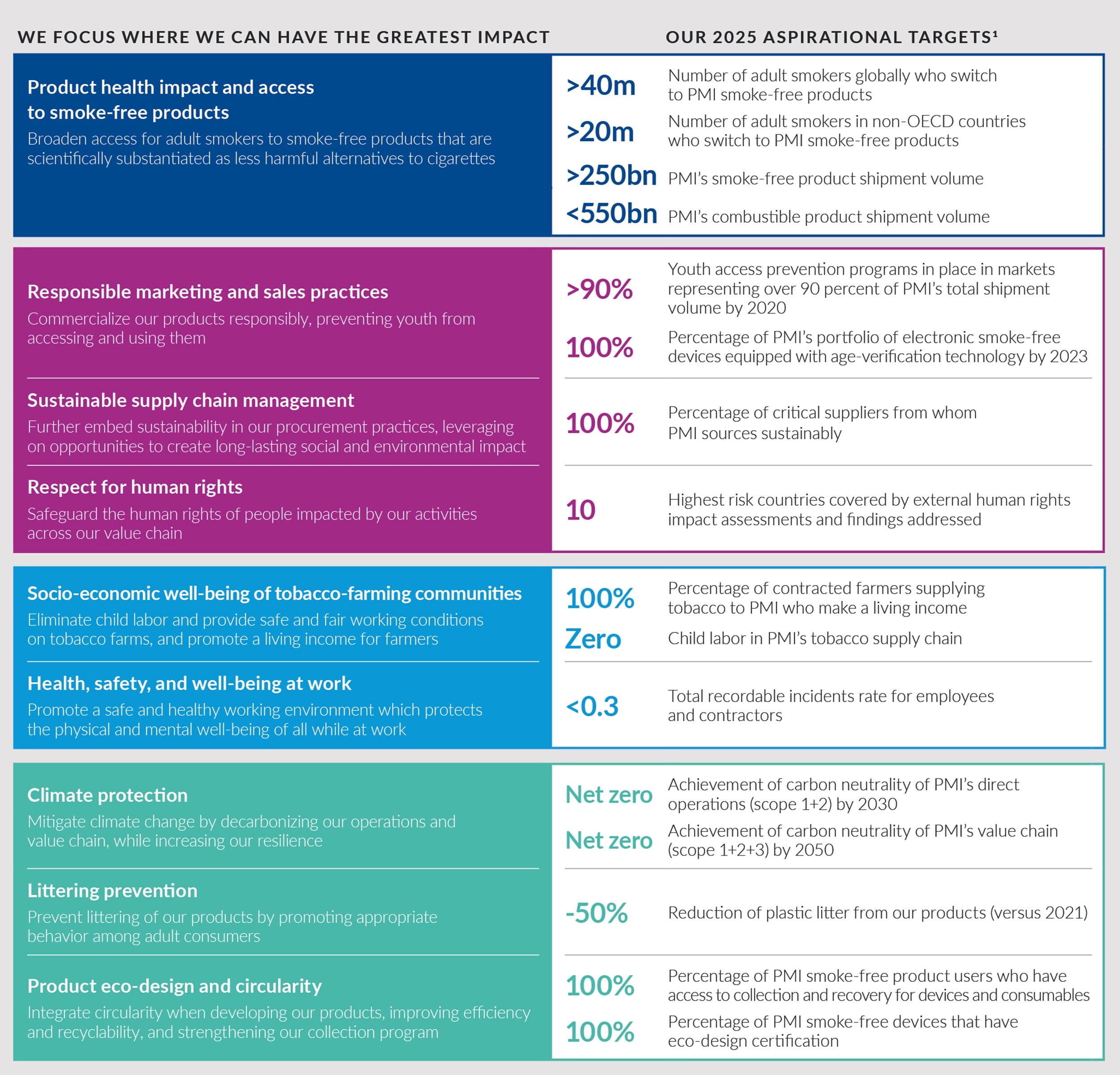
1 Note: Where targets refer to a different year than 2025, it is specifically indicated.
Measuring progress toward a smoke-free world
In 2016, the company introduced a set of bespoke Key Performance Indicators (KPIs), referred to as Business Transformation Metrics. These allow stakeholders to transparently assess, measure, and verify the steps we’re taking to achieve our purpose of delivering a world without cigarettes.
PMI’s 2019 progress on some of our key Business Transformation Metrics include:
We continued to shift significant resources towards delivering a smoke-free future, with 98 percent of total R&D expenditure and 71 percent of total commercial expenditure directed towards smoke-free products in 2019.
Our smoke-free product net revenues reached 18.7 percent of total net revenues in 2019, compared to 2.7 percent in 2016. By 2025, the company aspires to have 38 to 42 percent of total net revenues coming from smoke-free products. In 2019, net revenues from smoke-free products already exceeded 50 percent of total net revenues in four markets.
PMI’s smoke-free product shipment volume increased to approximately 60 billion units, up from 7.7 billion in 2016. We’re targeting more than 250 billion units by 2025. Our combustible product shipment volume in 2019 declined to 732 billion units, down from 845 billion in 2016, partly reflecting the impact of adult smokers switching to our smoke-free products.
Since announcing our smoke-free vision in 2016, PMI has delisted over 600 cigarette SKUs globally, while significantly broadening our portfolio of heated tobacco units, to over 400 SKUs.
At year-end 2019, there were an estimated 9.7 million users worldwide who have stopped smoking and switched to PMI’s lead heated tobacco product, compared to more than 6.6 million in 2018. PMI’s vision of a smoke-free future is a global and inclusive one, aiming to provide access to better alternatives to all adult smokers around the world who would otherwise continue to smoke.
Approximately half of PMI’s global cigarette sales volume is in non-OECD countries. The company therefore aspires that over 20 million smokers in non-OECD countries switch to our smoke-free products by 2025. This equates to half of our global aspiration of over 40 million users by that time.
ESG performance highlights from the Integrated Report 2019 include:
In 2019, PMI conducted a comprehensive review of the company’s commercial activities related to product marketing and sales activities. The study’s findings were published in December 2019 in a report, Responsible Marketing Practices, on PMI.com. By the end of 2020, PMI aims for youth access prevention (YAP) programs to be in place in markets representing over 90 percent of PMI’s total shipment volume. By 2023, PMI aims to have 100 percent of PMI’s portfolio of electronic smoke-free devices equipped with age-verification technology.
In 2019, PMI continued to assess and mitigate environmental risks and impacts across our value chain, including a 42 percent absolute reduction of CO2e scope 1+2+3 compared to our 2010 baseline – while 72 percent of electricity used and purchased within PMI factories was from renewable sources.
We have committed to achieving carbon neutrality in our direct operations (scope 1+2) by 2030 and across the company’s entire value chain (scope 1+2+3) by 2050. We continued to focus on the well-being of our tobacco farming communities. In 2019, we did not find any incidents of child labor in over 99 percent of the more than 300,000 tobacco farms monitored. By 2025, the company aims to have zero child labor in our tobacco supply chain, ensuring 100 percent of contracted tobacco farmers make a living income.
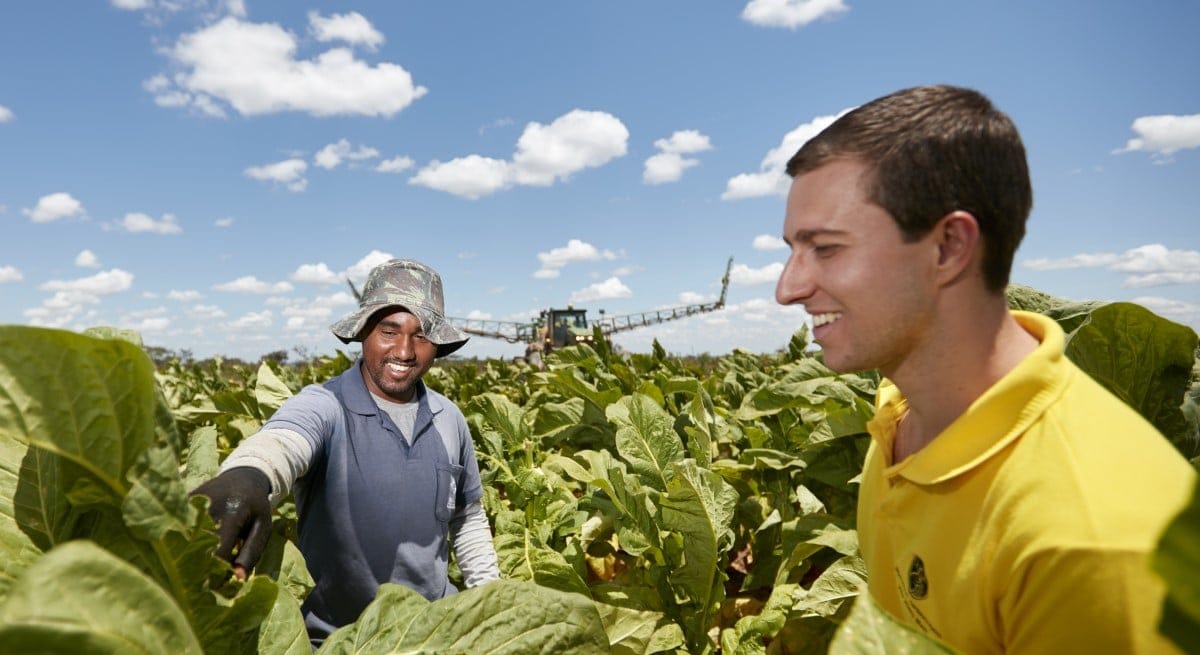
Huub Savelkouls, Chief Sustainability Officer, PMI, said: “Critics will always emerge, but performance can help dispel misperceptions. This report aims to provide a comprehensive overview of what PMI is about, combined with a holistic set of metrics that go beyond our financial disclosures, covering our business transformation, as well as environmental, social, and governance topics. We support and seek to align with GRI, SASB, and TCFD disclosure standards, enabling all stakeholders to benchmark our strategy and performance.” **
The Integrated Report is a tangible manifestation of this belief and the company’s commitment to transparently share our progress toward delivering a smoke-free future.
These highlights should be read in conjunction with the full text of PMI’s Integrated Report 2019. To access the complete Integrated Report 2019 or download the highlighted version, see below.
*André Calantzopouplos was speaking in his role as CEO at the time. On May 5, 2021, Jacek Olczak succeeded Mr. Calantzopoulos as CEO, and Mr. Calantzopoulos became Executive Chairman of the Board.
** Jennifer Motles succeeded Huub Savelkouls as Chief Sustainability Officer on November 1, 2020, following Mr. Savelkouls’ retirement from PMI.
Aspirational targets and goals do not constitute financial projections, and achievement of future results are subject to risks, uncertainties and inaccurate assumptions, as outlined in the forward-looking and cautionary statements on page 189 of the Integrated Report 2019. Key terms, definitions and explanatory notes are set forth in the Integrated Report 2019. In the 2019 Integrated Report and in related communications, the term “materiality,” “material,” and similar terms, when used in the context of economic, environmental and social topics, are defined in the referenced sustainability standards, and are not meant to correspond to the concept of materiality under the U.S. securities laws and/or disclosures required by the U.S. Securities and Exchange Commission.

